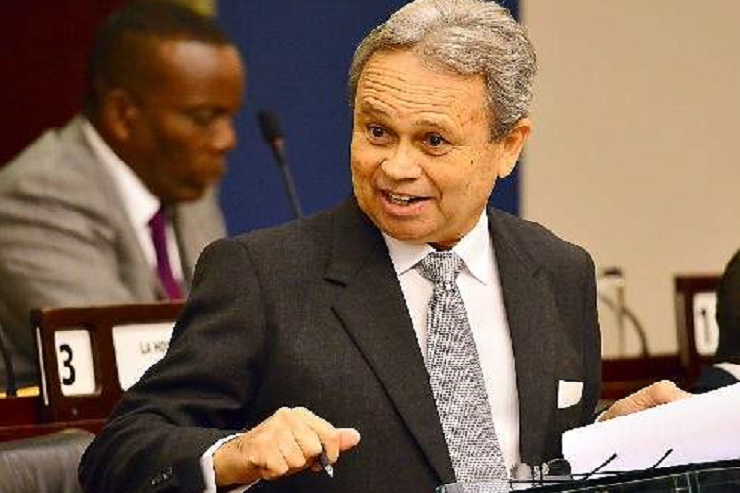
The Trinidad and Tobago government Thursday said that the country’s economy has turned around but urged continued discipline and production in order for the oil-rich twin island republic to experience growth and recovery in 2018.
Finance Minister Colm Imbert, presenting the mid-year review to Parliament, told legislators that “we are moving into an era of macro-economic stability which is now underpinning our recovery.
Imbert said that over the medium-term, the Keith Rowley administration is improving tax administrations and budget procedures and is seeking with the assistance of the World Bank “to eliminate waste and duplication in large areas of expenditure, such as education, health, national security and social programmes.
“We are very much aware that the continuing consolidation of our fiscal finances is an essential condition for achieving this objective. Our tax and expenditure adjustments and broad-based reforms are contributing towards the establishment of this foundation.”
“We recognize that this process is of a long-term nature and is painstaking, but it is essential for growth to be placed on a self-sustaining and long-term basis. As a government, we would always ensure that the benefits from our economic development are shared equitably among the members of our national community.
“We are not out of the woods yet, but after the sacrifices and prudent fiscal management of the last two and a half years, our economy is turning around. In particular, our core revenues from taxation are still fragile and still below TT$40 billion (One TT dollar=US$0.16 cents), while we are running a TT$50 billion economy, but we are finally experiencing growth and recovery in 2018.
“I am convinced that as long as we as a people are disciplined and productive, our country will recover, grow and prosper. And from all indicators, we are on the road to economic revival,’ Imbert said.
The Finance Minister said that after a long and discouraging period of economic decline, Trinidad and Tobago is now witnessing a welcome upturn.

“Early estimates are indicative of a growth forecast of two per cent in 2018 and 2.2 per cent in 2019, rising to 2.5 per cent in 2020. And contrary to the negative commentary of uniformed spokespersons, who speak without having any facts, the turnaround is being driven by economic expansion in both the energy and non-energy sectors.”
He told legislators that within the energy sector, the full impact of the Trinidad Region Onshore Compression (TROC) project, which came on stream in April 2017 and the Juniper Platform that became operational in August last year, were now materializing and that beginning in the fourth quarter of this year, a number of new gas fields would begin production which would boost gas production levels over the medium-term rising from 3.37 billion cubic feet per day in 2017 to an average of 3.80 billion cubic feet per day in 2018; 3.94 billion cubic feet per day in 2019; 4.05 billion cubic feet per day in 2020 and 4.14 billion cubic feet per day in 2021.
He said these production volumes are being driven by enhanced activities among the major oil and gas upstream producers including BP Trinidad and Tobago (BPTT), the Cassia gas compression project that will be in operation in 2020 as well as exploration drilling that would be taking place in the period 2019-2021.
Imbert said that with average gas production at significantly higher levels, up 20 per cent from the 2016 levels, the local energy sector has been revitalized.
“This boost in production is due to the hard work of a dedicated team… (which) has worked unwaveringly in complex negotiations and discussions with the oil and gas companies, and the downstream companies, both here and abroad, to secure this country’s future, in stark contrast to the empty posturing and grandstanding of the past.
“Accordingly, the energy sector is well poised to meet the demands of the downstream sector over the near-term horizon thereby supporting our medium-term growth recovery. Further ahead, access to additional gas from Venezuela will generate substantial opportunities for strengthening and supporting our economy.”

Imbert said that the pick-up in the energy sector is having a knock-on effect on growth in the non-energy sector where that sector is projected to break even in 2018, after years of decline, with growth estimates for the non-oil sector in 2019 of 1.2 per cent rising to 2.9 percent in 2020.
He said these improving growth forecasts are welcome in the context of the lackluster performance of the economy over the 2013 to 2017 period.
According to the Finance Minister the projection for the collection of taxes on income and profits in this fiscal year, up to April 2018, for “Other Companies”, which excludes oil and gas companies, was TT$3.8 billion. The actual collection was TT$4.9 billion, an increase of TT$1.1 billion.
He said in the petrochemical sector, the collection of corporation tax has moved from TT$371 million in the period October 2016 to April 2017 to TT$1.2 billion in the period October 2017 to April 2018, an increase year-on-year of TT$835 million.
“Very importantly, in the non-energy sector, which excludes oil, gas and petrochemical companies, collection of corporation tax has moved from TT$1.8 billion in the period October 2016 to April 2017 to TT$2.3 billion in the period October 2017 to April 2018, an overall increase of TT$500 million year-on-year, with revenue for assembly type industries increasing by TT$146 million and revenue from the financial services sector increasing by TT$153 million year-on-year from October to April.”
Imbert said it is clear, therefore, that not just the oil sector, but the non-oil sector is finally recovering.
He said total net collections of corporation tax in all sectors is up year-on-year for the period October to April by TT$1.3 billion.
In the energy sector in particular, despite PETROTRIN’s recalcitrance, the actual collection of petroleum profits tax and supplemental petroleum tax, excluding royalties, is up byTT$500 million year-on-year for the first seven months of fiscal 2018. Royalties, excluding PETROTRIN, are also on target to reach two billion dollars this year, according to Imbert.
“Further, because of the better than expected increases in natural gas production in the second half of 2017, the GDP (gross domestic product) figures for 2017 are being revised upwards and we expect that instead of negative growth of minus 2.6 per cent in 2017, the actual growth figure will be closer to minus one per cent”.
He said this improved outturn for 2017 and the expected growth in 2018 will have a substantial effect on the country’s nominal GDP, which is expected to increase by nine per cent to TT$168 billion in 2018, adding this will also have a direct positive effect on the debt to GDP ratio, which is now estimated to drop to well below 60 per cent, even with the planned borrowing programme in 2018.
Imbert told Parliament when the last budget was presented in October last year, it was formulated on price assumptions for oil at US$52.00 per barrel and gas at US$2.75 per mmbtu.
But he said, since that time, crude oil prices have been strengthening and have averaged US$59 over the first six months of the fiscal year and on Wednesday crossed US$71 per barrel.
“A word of caution, however, to those who think that high oil prices automatically translate into higher revenues. Regrettably, at the current fixed prices for gasoline and auto diesel, a high oil price creates a requirement for a high fuel subsidy.
“Indeed, if oil remains at US$70 a barrel, the fuel subsidy could reach as high as $900 million in 2018, which was not budgeted for. Additionally, our national oil company PETROTRIN, which produces almost 60 per cent of the country’s oil, is not paying its taxes and royalties.”
Imbert said that at current prices, this translates into one billion dollars in lost revenue in 2018, which is untenable.
“It is imperative, therefore, that in addition to transforming PETROTRIN into a viable and profitable organization, we must also complete the work on an appropriate formula that allows the price of fuel at the pump to move up and down with the movement of the price of refined petroleum products. As stated previously, it is our intention to have this mechanism in place by the end of 2018.
“As to the future, based on the best advice available, we do not envisage oil or gas prices to deviate significantly from their current trends, particularly in the context of the pick-up in global growth now being forecast for 2017 and 2018 of 3.6 percent and 3.7 per cent respectively,” he said.
Debate on the mid-year review is continuing in the Trinidad and Tobago parliament.
Advertise with the mоѕt vіѕіtеd nеwѕ ѕіtе іn Antigua!
We offer fully customizable and flexible digital marketing packages.
Contact us at [email protected]
















